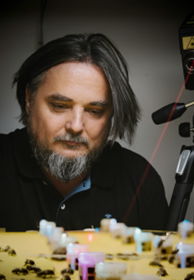-
Robotics as an Eco-Effective Contingency for Weakened Ecosystems?

Thu, Apr 11, 2024 @ 10:00 AM - 11:30 AM
Thomas Lord Department of Computer Science
Conferences, Lectures, & Seminars
Speaker: Prof. Thomas Schmickl , Professor - Institute of Biology at the University of Graz, Austria
Talk Title: Robotics as an Eco-Effective Contingency for Weakened Ecosystems?
Abstract: Our planet is on the brink of the 6th mass extinction, as our ecosystems are rapidly losing both diversity and biomass. As intra- and inter-specific interaction networks weaken, ecosystems become increasingly unstable, setting off on a downward trajectory along a deadly spiral. In my keynote, I will explore how robotic systems can play a crucial role in supporting ecosystems and communities. I will show three levels of agency how a „tech for good“ approach might be helpful to fight ecosystem decay: Monitoring, intervention and restoration. By mitigating ecosystem decay, robots may buy us precious time to address the root causes of environmental crises. I will show innovative systems that we’ve developed over recent years — the initial strides toward going beyond mere animal-interaction systems by establishing eco-effective robotics.
This lecture satisfies requirements for CSCI 591: Research Colloquium.
Biography: Thomas Schmickl (https://www.thomasschmickl.eu) is full professor at the Institute of Biology at the University of Graz, Austria. There he also supervises the Artificial Life Lab (https://alife.uni-graz.at), which he founded in 2007 after returning from a HHMI visiting professorship in the USA. In 2012, he was appointed the Basler Chair of Excellence at the East Tennessee State University (ETSU). His research focuses on the biology of social insects and on ecological modeling, as well as on bio-inspired engineering including swarm-, modular-, hormone-, and evolutionary- robotics. He was/is a partner in the EU-funded projects I- Swarm, Symbrion, Replicator, FloraRobotica, RoboRoyale and serves as the leading scientist and consortium coordinator of the EU grants CoCoRo, ASSISIbf, subCULTron, Atempgrad and Hiveopolis. His research seeks to improve the current state-of-the-art in robotics to allow robotic agents to be more like animals or plants, by being more adaptive, resilient, and flexible. Living organisms are parts of his targeted bio-hybrid robotic systems, with the goal to form sustainable organism-technology symbioses. In 2018, he founded the Field of Excellence COLIBRI (Complexity of Life in Basic Research & Innovation, https://colibri.uni-graz.at) at University of Graz, a network of full professors researching complexity with a focus on living systems, joining forces across various disciplines.
Host: Prof. Wei-Min Shen, Associate Professor of Computer Science Practice
Location: Henry Salvatori Computer Science Center (SAL) - 126
Audiences: Everyone Is Invited
Contact: Thomas Lord Department of Computer Science
This event is open to all eligible individuals. USC Viterbi operates all of its activities consistent with the University's Notice of Non-Discrimination. Eligibility is not determined based on race, sex, ethnicity, sexual orientation, or any other prohibited factor.




